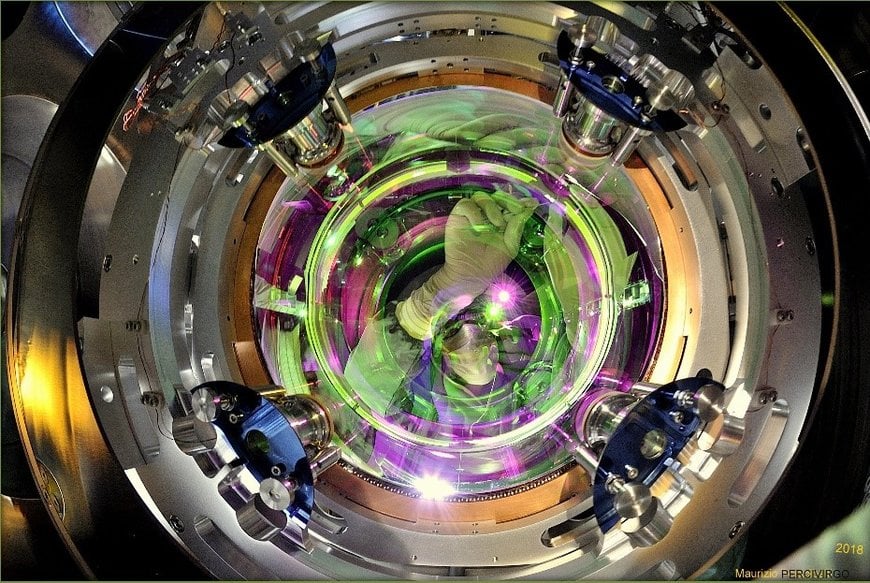THALES – SESO® OPTICS CHOSEN FOR HIGH-PRECISION OPTICS POLISHING ON THE EUROPEAN ADVANCED VIRGO+ PROJECT
Thales – SESO® Optics, a French manufacturer of high-precision optics, has won a contract from the advanced materials laboratory (LMA) at the French Scientific Research Center (CNRS) to polish critical optics for the European Advanced Virgo+ project.

A Virgo mirror being suspended in its seismic attenuation system. / Photo credit: M.Perciballi - EGO
- Thales – SESO® Optics has won a contract from the French National Scientific Research Center (CNRS) to polish critical optics for the European Advanced Virgo+ project.
- Advanced Virgo+ is designed to detect the gravitational waves that Albert Einstein predicted 105 years ago.
- These gravitational waves are caused by distant cosmic events that produce gravitational waves, such as black hole and neutron star mergers.
Advanced Virgo+ is the latest upgrade of the Virgo interferometer, designed to detect the gravitational waves that Albert Einstein predicted 105 years ago. It uses a very large-scale interferometer near Pisa, Italy, comprising two 3-km long arms and a very large vacuum chamber. A laser beam is injected and is reflected back and forth between the mirrored surfaces about 400 times. This interferometer is able to detect a difference in size between the two arms as small as 10-19 meter, caused by the space-time contraction induced by gravitational waves. Using this small contraction and the associated exceptional accuracy, the interferometer can detect and measure distant powerful cosmic events, such as black hole mergers, which are gravitational-wave emitting systems.
Thales – SESO® Optics, based in Aix-en-Provence, southern France, has been selected to polish the four mirrors, each 550 mm in diameter, needed to deliver this outstanding performance. To achieve this level of precision, Thales – SESO Optics has to master sub-nanometer scale structures, down to the size of an atom. The increase in the mirror sizes, from 350 mm to 550 mm for Advanced Virgo +, will improve the accuracy by a factor of 3 compared with Advanced Virgo, the actual version of the instrument. The technical challenge is to combine very high precision of polishing with an increase in the weight of the mirrors, which has increased from 40 kg to 100 kg. These mirrors will be the heaviest ever made for a gravitational wave detector.
This planned upgrade of the original Virgo Interferometer will allow astronomers to observe powerful cosmic events on a scale one order of magnitude larger than the previous version, and also observe less powerful cosmic events.
With more than 50 years of experience in the demanding field of high-precision mirror polishing, Thales – SESO® Optics has constantly developed and improved its technologies. Once polished, these mirrors will also be given a high-precision coating to a uniform thickness of better than 0.1%, a technology applied by the advanced materials lab at CNRS.
Gravitational waves were first detected in September 2015, making this one of the most cutting-edge fields in astronomy and a source of exciting new technologies.
www.thalesgroup.com

